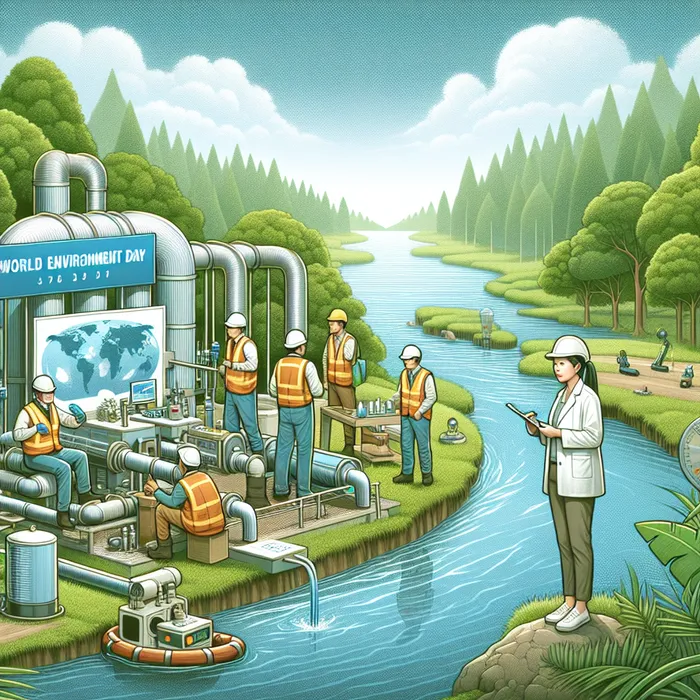South Africa's infrastructure crisis: WRC demands urgent climate resilience training

World Environment Day is celebrated on June 5.
Image: Ron
As World Environment Day is commemorated on Thursday, the Water Research Commission (WRC) has called for reskilled and upskilled workers to incorporate climate resilience into their work.
South Africa is reportedly facing an infrastructure crisis that threatens its ability to cope with the realities of climate change. The country’s drainage systems are overwhelmed by heavy rainfall, while dam storage capacities are compromised by sedimentation.
Roads and bridges are deteriorating at an alarming rate, reflecting a broader issue: the skills required to maintain and develop infrastructure have not evolved to meet current challenges.
Lesego Gaegane, Senior Project Manager at the Water Research Commission (WRC), said the cracks in our infrastructure serve as a stark reminder of a nation unprepared for climate realities and emphasised the need for infrastructure that can adapt to climate impacts.
“Our current urban drainage systems are not adequately equipped to handle these changes,” she said.
Many engineers, artisans, and planners are trained in outdated systems that do not align with the current needs on the ground. To address this, there is a pressing need for reskilling and upskilling in climate resilience practices.
“Although heavy rainfalls have occurred, we cannot store as much water as needed because our dams are not at full capacity due to sedimentation. Poor land use contributes to this issue, and we lack an optimal approach to manage it,” Gaegane explained.
The challenges extend beyond technical aspects; they involve systematic planning for the long term.
“When we build infrastructure, insufficient thought is given to maintenance. This oversight leads to new constructions failing within five years due to a lack of proper maintenance plans,” she said.
The solution lies not in new policies but in practical skills development.
“When constructing a dam or power plant, skills development must be included in contracts to ensure knowledge transfer to young engineers. If we do not integrate skills development into project delivery, we risk creating infrastructure that fails prematurely, leading to higher costs and service disruptions,” Gaegane said.
To foster sustainability, she said, South Africa must cultivate cross-sector competencies that reflect the interdependence of water and energy systems. Water is essential for energy production, particularly in hydropower and cooling systems, while energy is critical for every stage of the water cycle, from abstraction to treatment and distribution.
For instance, energy auditing within water utilities can help reduce operational costs, while understanding water footprints in energy production supports more efficient resource use. Embedding these skill sets across engineering, planning, and operations curricula is not just important; it is urgent.
“This isn’t optional. Skills development is essential for preventing collapse. Infrastructure cannot exist without skills, and resilience cannot be achieved without both,” Gaegane said.
At the recent DEVAC Infrastructure Summit in Johannesburg, Gaegane called for a collaborative approach to infrastructure development, integrating training requirements directly into contracts while promoting local innovations.
“TVET colleges must play a central role in this effort, recognising that Africa’s infrastructure future relies not only on engineers and scientists but also on skilled technicians and artisans,” she said.
One notable initiative is the Giyani Local Climate Resilience Programme, which deploys solar-powered boreholes while training local communities in managing both water and energy infrastructure. This dual-skilling approach has improved operational reliability, reduced costs, and created sustainable employment opportunities.
Under Gaegane’s leadership, the National Siltation Management Programme (NatSilt) has pioneered occupation-based skills programmes focusing on dam siltation, ecological restoration, and catchment rehabilitation. These training programmes, developed with a recognition of prior learning framework, have secured accreditation from the Quality Council for Trades and Occupations and partnered with the University of Johannesburg to mainstream Dam Siltation Management short learning programmes for sector-wide upskilling.
Gaegane emphasised the importance of championing local innovation.
“African solutions rooted in local knowledge will yield the most resilient outcomes. We must not overlook the vital role of ecological infrastructure; our natural buffers are essential complements to engineered systems,” she said.
The summit's discussions reinforced the notion that Africa’s infrastructure must be both climate-resilient and people-resilient.
KwaZulu-Natal MEC for Public Works and Infrastructure, Martin Meyer, highlighted the regional significance of infrastructure, stating that if KwaZulu-Natal ports fail, South Africa and Africa fail.
Deputy Minister of Electricity and Energy, Samantha Graham-Mare, advocated for policy reforms that support localisation, while Namibia’s Minister of Works and Transport, Veikko Nekundi, underscored the need for genuine cross-border collaboration.
“Our collective challenge, and indeed our profound opportunity, lies in transforming the continent’s infrastructure pipeline into a dynamic platform for skills, innovation, and inclusivity. It is essential that the people of Africa, particularly women, youth, and rural communities, are placed firmly at the heart of this transformative journey,” Gaegane said.
robin.francke@iol.co.za
IOL
Related Topics:
